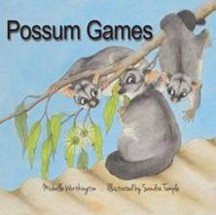Possum Games by Michelle Worthington

Ill. by Sandra Temple. Rhiza Press, 2014. ISBN 9781925139136
(Age: Early childhood) Every night, on a rusty tin roof the possum
family hold The Possum Games. They jump, run, hop and skip, have a
tug-of-war, strap soap to their feet to slide down the roof and play
all sorts of ball games using mangoes and melons, until the stars
fade and it's time to pack away the trophies and medals till the
next night . . . What fun they have. All except Riley. He is the
youngest and the shyest and he can't keep up. The noise frightens
him and when it comes to needing a partner, he never has one. Even
in team games he isn't very good. Until one night the humans emerge
from their house bleary eyed and not in the mood for fun. Suddenly,
Riley finds what he is good at and invents a whole new game in the
process!
Miss 3 loved this story when I shared it with her. She empathised
with Riley because she knows what it's like to try to keep up with
her older sister and cousins. Even though they are very patient with
her and include her in everything, just as Riley's family includes
him, there are times when being three and little just aren't quite
enough.
The beautiful illustrations by Sandra Temple are in a style that is
realistic without being too "biological" for this audience (she is a
wildlife artist and has won a number of awards for her work) and the
expressions on the possums' faces and the humour in their actions
really bring the text to life. Every picture of Riley mirrors that
of a young child wanting to be part of the action but now quite
there yet. (You can have a sneak peek at http://www.youtube.com/watch?v=Z3IRZcftyMU)
However, apart from the charm of the story for the story's sake,
there is also an opportunity for a conversation about including
everyone in activities and introducing the concept of compassion.
How do you think Riley feels? Is it more important to win a trophy
or make sure that everyone has some fun? Can everyone be the best at
everything or do we all have things we are not-so-good at? Children
know their strengths and weaknesses and those of their siblings and
peers and they are quick to apply negative labels to others so they
can build their own self-esteem. But those labels can stick long
after they've been applied. This could be opportunity to help them
look for the positives in others so even the Rileys feel comfortable
about joining in - even if "the watermelon splatters in soft red
chunks" when they try to catch it! A great story for all those who
would like to be a teensy bit older!
Barbara Braxton